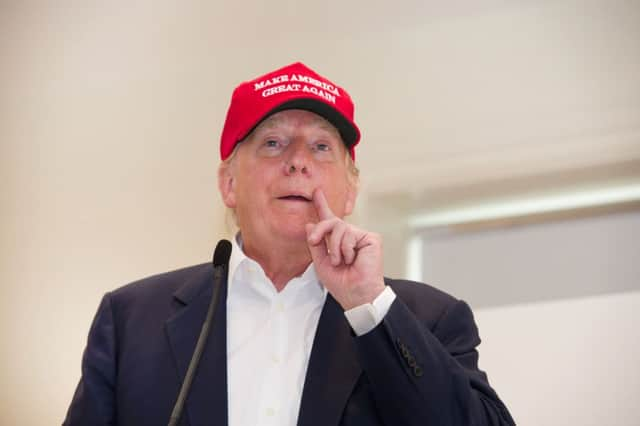OK, Trump won. Now what?


For some, having Trump at the helm of the USA is a frightening thought.
Outgoing President Barack Obama has said he is “uniquely unqualified”. But he does find support in some quarters. Trump is an “agent for change,” according to Nigel Farage.
Advertisement
Hide AdAdvertisement
Hide AdTrump in many ways is a unique presidential candidate. No career politician, he is a businessman – his wealth is estimated at £3.7bn (£2.96 billion) according to Forbes – who has dabbled in reality TV and has not an ounce of political experience. But this doesn’t mean his run in office, if elected, would be a disaster.
Trump will find it hard to make good on the various controversial and divisive visions for the US he has set out, including the now infamous Mexican wall.
That’s because although presidential powers have been expanding, if elected, Trump, like those before him, will encounter many limitations in bringing about change. He will be able to make treaties (official agreements with other nations), but only if two-thirds of senators agree.
He could break international agreements such as the Iran nuclear deal and the Paris climate accords, and he would have control over the US nuclear arsenal. There could be one hell of a stink from Congress though, and if there wasn’t public support for his policies, and if there is enough of an outcry, they may still not happen.
Advertisement
Hide AdAdvertisement
Hide AdTrump can’t make laws – these have to be agreed in the House of Representatives and the Senate – but he can veto bills. Ultimately this can be overridden by Congress. He can’t raise or lower taxes without Congressional approval.
He has to fund things according to what Congress has approved. So if things need funding, he’s going to have to convince Congress.
There’s also plenty Trump could bring to the Oval Office desk that voters find appealing. He wants to hold Washington to account – his whole campaign has been riding the anti-Establishment wave. This is attractive to voters because they believe a rich businessman will be impervious to corruption.
To those in Trump’s inner circle, business and the classic skills associated with being in the industry are his strengths.
Advertisement
Hide AdAdvertisement
Hide AdHis adviser Anthony Scaramucci recently told the BBC Radio 4 Today programme that after the media has gone “bonkers crazy” over Trump’s election win, “they’re going to find… he’s a deal maker, negotiator”.
“He’ll bring a magnanimous side to his personality out that will shock everybody.”
High on Trump’s agenda will be to “cut a deal” with the Democrats and discuss with international allies how they can have a better relationship, says Scaramucci, adding: “This is a very, very good man and this is a guy that can run the country because he’ll surround himself with the right people.”
One international ally keeping a close eye on the race for the White House is the largest foreign investor in the US: the UK.
Advertisement
Hide AdAdvertisement
Hide AdNaturally the UK has a vested interest in keeping the “economic special relationship” between both of the countries alive and John Dickerman, the CBI head of the US, says the industry finds both Trump and Clinton’s commitment to “building on, and developing, this unique political and trading partnership” encouraging.
Running a business and running a superpower are two different things. However, one would hope that Trump’s grand claims about his business empire – some of which have been contested – mean he is a man who understands the economy.
His vision to create a “dynamic booming economy that will create 25 million new jobs over the next decade” should be welcomed if it’s deliverable.
US presidents tend to have more control over foreign policy than domestic policy. And Trump plans to apply his business skills to international relations by taking a more transactional approach.
Advertisement
Hide AdAdvertisement
Hide AdHe wants to make sure the US benefits from its international alliances. This attitude is most summed up by his frustrations over the military alliance Nato – a Cold War-era agreement between nations to help one another if one comes under attack – saying the US cannot afford to pay for countries in Europe without compensation.
But Trump is not the only one to vent about Nato. The alliance requires members to spend two per cent GDP on defence and in March, outgoing US President Barack Obama called on the then UK Prime Minister David Cameron to ensure the UK paid “its fair share” on defence.